Best 5 Optical (Light) Microscopes To Choose In 2022 Reviews
Have you been wondering about what optical microscopes actually are?
Then read this post!
In this post I will tell you what light microscopes really are, I will present to you several types of microscopes with light, and it might help you decide whether you need one of them, and which one is best for you.
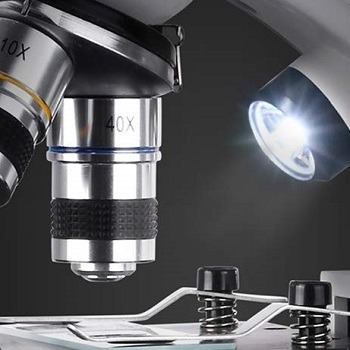
What Are Optical Microscopes And What Types Exist?
What Are They?
Light microscopes, also known as optical microscopes, are devices that use light and a system of lenses to show a magnified image of the object that is being observed through the lens.
Where Do They Come From?
Optical microscopes are the first type of microscopes ever made, invented around the 17th century. Now they are used most widely in schools or even at homes, due to their simplicity. However, some light microscopes can have more complex structures.
Types Of Light Microscope
Two types of light microscopes are the simple microscope and the compound microscope. A simple one uses the optical power of one lens (or a small group of lenses) for magnification, whereas the compound microscope uses a whole system of lenses to achieve even higher magnification. Some microscopes that don’t use visible light are scanning electron microscopes, transmission electron microscopes, and scanning probe microscopes.
Which Illumination Types Can Be Used?
There are many different ways to set the light path, in order to produce an improved contrast image from the object. Some of them include cross-polarized light, phase contrast, darkfield, and differential interference contrast illumination, and they generate increased contrast in the sample image.
Advantages Of Light Microscopes
Optical microscopes, being usually of a simpler design, are more portable and more-cost friendly than some other types of microscopes. They are most used for observing living cells. The low and medium magnification makes it possible to observe some types of micro-biological activity and movement of cells.
Best 5 Optical Microscopes Reviews
Best Binocular Compound Light Microscope
Leica DM300 Binocular Microscope
Professional Design
The EZTube™ eyepieces have preset diopters and an adjustable interpupillary distance (ranging from 2–3 inches). The microscope has a rotatable viewing head, with the integrated 10x/0.7-inch eyepieces set at a 30° angle, and a non-removable pointer set in the right eyepiece.
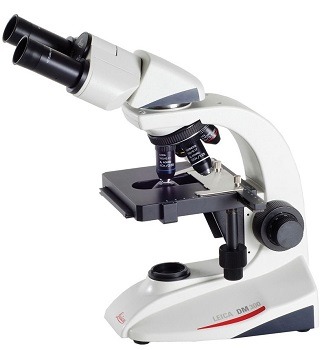
Easy Maintainance
The focus mechanism consists of a brass shaft and is sealed against dust, which means it will be cleaner for a long time. The spring-loaded objective stopper mechanism prevents damage to slides and objectives, which preserves your specimens and your device.
LED Illumination
Leica light microscope has an LED microscope light source. The cool white LED light operates with 80% less energy consumption, and it has an estimate of 20 years’ worth of light (at average use), which means you will not need to replace the bulb often. The non-heating part ensures the integrity of your specimens.
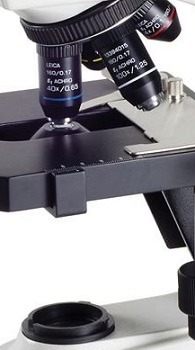
Objectives And Magnification
This device comes with the usual 4-objective turret nosepiece, and it has the E1 Achromat objectives in 4x, 10x, 40x, and 100x magnification power. The 0.9/1.25 oil N.A. adjustable Abbe condenser has magnification labels for achieving optimal contrast, and this will help you get good results with the image.
Device Practicality
This binocular light microscope’s dimensions are 17 x 12 x 16 inches, and its weight is 14.5 pounds. The mechanical stage has a low-position control in the X and Y axis and is designed for accurately adjusting and moving the specimen slides even at high magnifications.
- safe and efficient illumination
- objective stopper
- adjustable eyepieces
- 4 objectives
- simple design
- mechanical stage
- non-removable pointer
- 1 light setting
- heavy
Best Bright Field Light Microscope
AmScope M500 Compound Light Microscope
Up To 1000x Magnification
This compound light microscope has only one eyepiece, but 4 objectives on a forward-facing nosepiece. They range from 4x, 10x, 40x, and 100x DIN achromatic glass objectives, which also provide color correction of magnified images. The objectives have a spring-loaded safety feature.
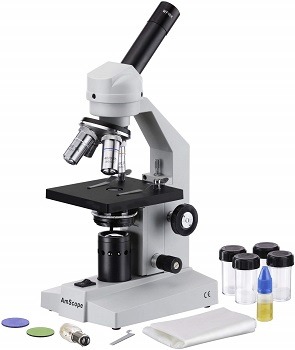
Bright Field Imaging
This device has rheostat-controlled incandescent tungsten illumination, which provides bright light. Brightfield illumination system allows the specimen to absorb light, and this makes transparent specimens more visible and results in a dark image on a light background. The 1.25 NA Abbe condenser with spiral-control has an iris diaphragm and comes with a color filter.
Plain Stage
This compound optical microscope has a plain stage that doesn’t move but still has clips to secure the specimen slides in place. The separate coarse and fine focus knobs have tension control and offer precise focus thanks to its rack-and-pinion mechanism.
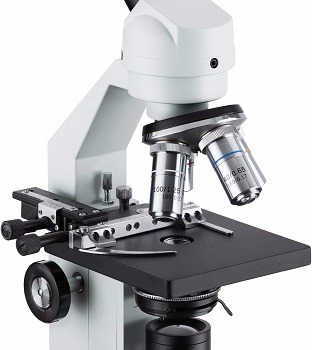
Design And Dimensions
AmScope light microscope has a solid metal frame, with a stain-resistant enamel finish that makes the device sturdier, and its cleaning and maintenance easier. The device’s dimensions are 18 x 17 x 12 inches, and it weighs 8 pounds.
Monocular Viewing Head
Even though the monocular head lacks the viewing comfort of a binocular one, that does not make it less efficient. This 360° rotatable viewing head has one 10x widefield eyepiece, fixed at a 45° vertical inclination, and this is to reduce eye and neck strain. It also has an anti-mold coating which serves to preserve the optics even in highly humid areas.
- metal frame
- bright field illumination
- rheostat control
- anti-mold coating
- monocular head
- plain stage
Best Monocular Compound Light Microscope
Telmu Microscope 1000X Dual LED Cordless
Microscope With Phone Adapter
The Telmu monocular compound microscope comes with a phone holder adapter. It lets you attach your phone on the microscope eyepiece, and holds it in place. This allows you to take pictures and videos of the specimen with your phone camera and software.
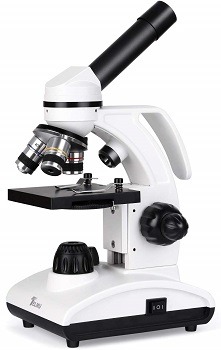
5 Magnification Settings
The 360° rotatable nosepiece has 3 objectives (4x, 10x, and 40x), and 2 eyepieces (10x and 25x), which can be combined to achieve the magnification range from 40x, 100x, 250x, 400x and up to 1000x. This is different from most standard microscopes that usually have 4 objectives and one eyepiece type.
Dual LED Illumination
This compound light microscope has a dual LED light source, which enables you to illuminate your specimen in two different ways. The incident and transmitted LED lighting lets you see both opaque objects (by illuminating from above), as well as more translucent specimens (by illuminating them from below).
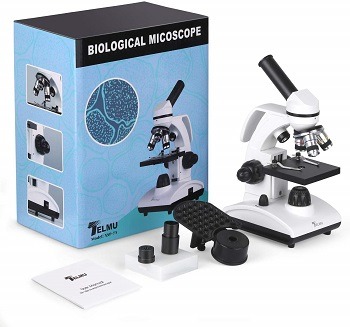
Cordless Microscope
The aforementioned cold-light LEDs are powered by 3 standard AA batteries (-which are sold separately). That means that this microscope can be used without being plugged into a power source socket. This makes it possible for you to carry it with you on the field for on-the-spot research. The practical handle will make this even easier. The device weighs only 3.8 pounds, and its dimensions are 13.4 x 11.1 x 6.8 inches.
Additional Equipment
Besides the two eyepiece types you can change between, the Telmu microscope has a 5-color filter palette, which enables real-time color correction as you observe the specimen. This device also comes with blank slides, and 4 example prepared slides, which you can take and practice using the device on.
- 2 types of LED illumination
- 5 color filters
- good magnification range
- cordless use possible
- comes with a phone adapter
- metal frame and handle
- small and lightweight
- 3 objectives
- the LEDs can only be used separately
- batteries not included
- batteries aren’t rechargeable
Best Biological Light Microscope With Camera
Omax 2000x Digital Binocular Microscope
Dissecting Light Microscope
This device has an impressive magnification range of 8 settings: 40x, 80x, 100x, 200x, 400x, 800x, 1000x and up to 2000x. This makes it one of the more powerful microscopes around. Its dimensions are 17.5 x 12.6 x 10.7 inches, and it weighs 13.2 pounds.
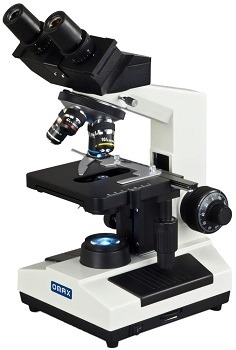
2-Layer Stage
Double-layer mechanical stage allows you to adjust the specimen, as it moves in two directions, and the co-axial fine and coarse focus knobs make it easier for you to get a sharp, clear image, even at high magnification.
Binocular Optics
Omax microscope has 4 achromatic DIN objectives (4x, 10x, 40x and 100x), and 2 pairs of eyepieces (WF10X and P20X). The binocular viewing head has an adjustable interpupillary distance.
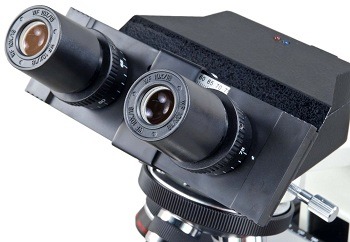
Microscope Light Source
This device uses an adjustable 20W halogen light, and the NA1.25 Abbe Condenser with iris diaphragm, and two removable color filters (blue and green). They enable color correction during observation.
Light Microscope With Camera
This light microscope has a built-in 3.0MP camera, which connects to a PC via USB cable. The camera comes with advanced software that is compatible with Windows (2000/XP/Vista/7 -32bit and 64bit), as well as Mac OS. It enables taking pictures of the specimen observed, without the fuss of having to connect a phone on an eyepiece.
- built-in camera
- USB connection
- 2 color filters
- 2-layer stage
- cable connection
- not compatible with every OS
Best Handheld Digital Microscope With Light
Dino-Lite AM3113 230x Optical Magnification Microscope
Small Digital Microscope
This small cylindrical microscope with LED light source has 8 LEDs that are built-in around the nosepiece, and give a white-light illumination. Some similar models have a rheostat that regulates the illumination intensity.
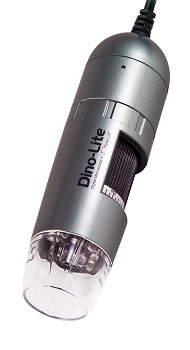
Image Resolution
This device has a sharp image, suited even for industrial product inspection and similar applications. The AV video resolution on a TV output is 640 x 480p (0.3MP) image resolution, 30 FPS video refresh rate. You can even buy the 15-foot long Video Cable extension to connect your microscope to your screen from further away.
Magnification Range
Considering this type of handheld microscope does not have changeable objectives, it does, however, have a magnification range from 10x and up to 230X. The magnification is regulated by rotating the focus ring on the device.

Software Compatibility
The software is included with the device, and it offers multiple features you can use, like saving, annotating, comparing, and analyzing images captured with this digital microscope. It is compatible with several instances of Windows (XP/Vista/7/8/10) and Mac OS (10.5 +).
Design And Dimensions
The dimensions of this cylindrical Dino-Lite microscope are 1.5 x 1.5 x 4.5 inches. It weighs only 1 pound, which makes it very portable and ideal to take with you, wherever a handheld digital microscope with its own light source is needed.
- light
- handheld
- digital
- 8 LEDs
- low magnification
- plastic
- low resolution
Conclusion: Which Optical Microscopes To Buy?
In my opinion, the best light microscopes are the Telmu 1000x Dual LED Microscope and the Omax 2000x Digital Binocular Microscope. The Telmu optical microscope has two types of LED light sources and can be battery-operated. The Omax has a good magnification range (up to 2000x) and a double-layer stage. The Omax also has a built-in camera that connects to a PC via USB cable.
If you want to know more about other types of microscopes, read this post about compound microscopes, or this one about stereo microscopes. To browse more options for various microscopes you can buy, read this post on microscopes for sale.
